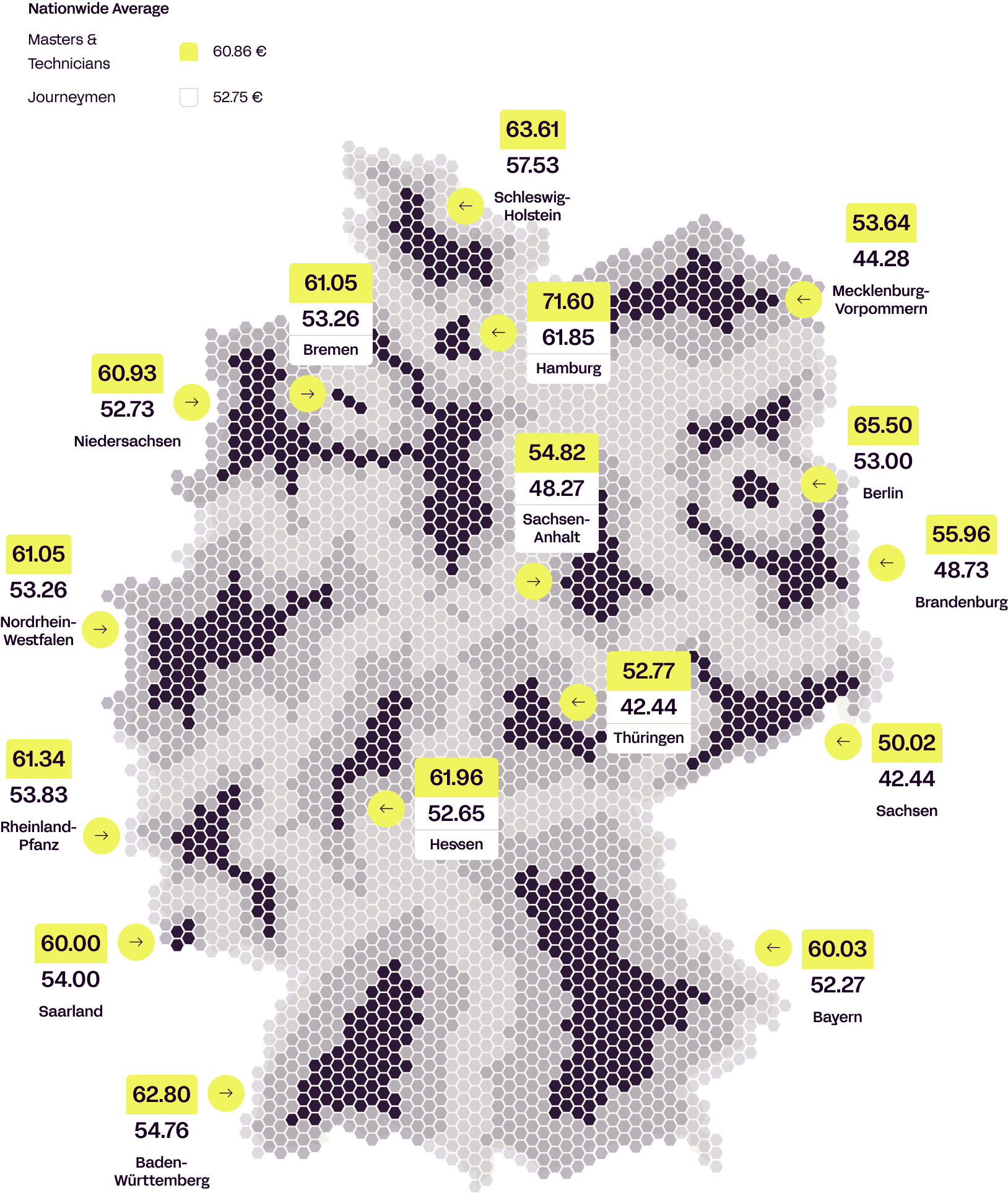
OneQrew Readies for Further Expansion


A staggering 93 percent of German craftsmanship companies have raised their hourly rates since January 2021, with over half of these increases occurring within the current calendar year. This finding comes from a survey conducted by a consortium comprising TAIFUN, M•SOFT, P Software & Service, and extragroup among nearly 700 German skilled craft businesses. According to the responses, the average rate for a master/technician hour is 61 euros, while a journeyman hour is estimated at 53 euros.
Price increase pressure has escalated in recent months: while only 51 percent of surveyed companies increased their hourly rates in 2021, this figure jumped to 68 percent within the first four months of 2022 alone. Thirty percent reported raising rates in both years. The trend is consistent across various trades: for instance, approximately 88 percent of electrician companies have increased their hourly rates, with similar numbers for the plumbing & HVAC sector (93 percent) and carpenters and joiners (94 percent).
Hourly rates vary considerably among the different German states. For example, for master technicians an hour in Hamburg averages 72 euros, while craftworkers in Saxony charge only 50 euros. A similar pattern emerges for journeyman hours: Hamburg is again the most expensive at 62 euros, and Saxony is the least expensive at 42 euros. Schleswig-Holstein ranks as the priciest state overall, with a master hour averaging 64 euros and a journeyman hour at 58 euros.
A distinct East-West divide is evident: in the new federal states, master craftworkers’ working hours cost an average of 14 percent less than in the West, while journeymen’s hours are 13 percent less.

Dominik Hartmann, CEO of the consortium, notes:
“We are currently observing a market price adjustment, which is unsurprising given the rampant record inflation. However, other factors are at play: the construction boom continues unabated, and thousands of skilled workers are needed for the energy transition. Skilled craft businesses face enormous demand and urgently require additional staff. However, finding new talent is difficult, leading to an imbalance between supply and demand, as many consumers seeking short-notice appointments with craftworkers have experienced firsthand.”
The skilled worker shortage and challenges in finding young talent are especially pronounced among roofers and framers, with 75 percent of companies reporting open positions. Similar trends are seen in other trades, with two-thirds (67 percent) of all surveyed craft businesses currently seeking new employees.
To attract and retain employees, companies provide various benefits and additional services, including high-quality tools and clothing (77 percent), Christmas and vacation pay (71 percent), private use of company vehicles (63 percent), company-sponsored training programs (62 percent), and company cell phones (52 percent). Almost one in ten companies (eight percent) even offer a four-day workweek.
With the release of its inaugural edition, the consortium is establishing the Price Index for Skilled Crafts as a recurring publication. Moving forward, they aim to provide a comprehensive economic overview of the industry at regular intervals, shedding light on current trends. The group can rely on a network of over 17,000 craft businesses, which are already part of their rapidly expanding customer base.
Dominik Hartmann, CEO of the consortium, states:
“Through our software solutions, we assist craftworkers in all areas of their business today. Aspects such as customer engagement, project planning, execution, and billing are all evolving with the digital transformation of the craftsmanship industry, which we actively support and help shape. Our day-to-day work with our customers ensures we stay up to date on the opportunities and challenges facing the industry. As a result, we strive to provide the best support possible for our customers in addressing current challenges. The skilled worker shortage and difficulties in finding young talent are among the most pressing issues today, which is why our first Price Index for Skilled Crafts focuses on these topics. We believe that the price increases in the industry can be attributed, at least in part, to individual companies’ efforts to become more attractive employers and boost the overall reputation of the industry. Higher hourly rates are a prerequisite for offering higher, more appealing wages.”
For the nationwide Price Index for Skilled Crafts, the consortium, composed of TAIFUN, M•SOFT, P Software & Service, and extragroup, surveyed a total of 680 German skilled craft businesses. These businesses primarily represent trades such as plumbing, heating, air conditioning, electrical engineering, roofing, carpentry, joinery, and framing. The responses were gathered through an online survey conducted between April 20 and May 12, 2022.
